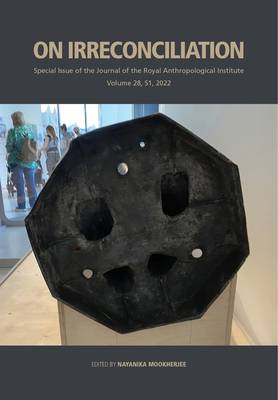
Onze Vivlio e-readers ondervinden momenteel synchronisatieproblemen. We doen er alles aan om dit zo snel mogelijk op te lossen. Onze excuses voor het ongemak!
- Afhalen na 1 uur in een winkel met voorraad
- Gratis thuislevering in België vanaf € 30
- Ruim aanbod met 7 miljoen producten
Onze Vivlio e-readers ondervinden momenteel synchronisatieproblemen. We doen er alles aan om dit zo snel mogelijk op te lossen. Onze excuses voor het ongemak!
- Afhalen na 1 uur in een winkel met voorraad
- Gratis thuislevering in België vanaf € 30
- Ruim aanbod met 7 miljoen producten
Zoeken
On Irreconciliation
€ 35,45
+ 70 punten
Omschrijving
On Irreconciliation focuses on the less examined but frequent ethnographic instances when survivors refuse to forgive in response to persistent impunity of past injustices, particularly, in the face of absence-presence of the rule of law and staged processes of justice which serve the powerful.
- An ethnographically-informed, interdisciplinary theorisation which makes irreconciliation visible in the contexts of Northern Ireland, Papua New Guinea, Mozambique, Bangladesh, Canada, Argentina, Sri Lanka, Colombia, USA and UK
- Triangulates a discussion of the rule of law within processes of unresolved genocidal injustices, debates relating to statues of slave owners, racial prejudice and institutional responses
- Contributors demonstrate the relationship of irreconciliation with law, aesthetics, temporality, resistance and the limits of the concept
- Makes a theoretical and ethnographic case for irreconciliation as both a social and political phenomenon
- Proposes an understanding of the past based on a positive commitment to 'irreconciliation' which might interest anthropologists, historians, philosophers, critical legal and political theorists, peace, conflict resolution and transitional justice scholars
Specificaties
Betrokkenen
- Uitgeverij:
Inhoud
- Aantal bladzijden:
- 192
- Taal:
- Engels
- Reeks:
Eigenschappen
- Productcode (EAN):
- 9781119933267
- Verschijningsdatum:
- 12/07/2022
- Uitvoering:
- Paperback
- Formaat:
- Trade paperback (VS)
- Afmetingen:
- 166 mm x 244 mm
- Gewicht:
- 294 g

Alleen bij Standaard Boekhandel
+ 70 punten op je klantenkaart van Standaard Boekhandel
Beoordelingen
We publiceren alleen reviews die voldoen aan de voorwaarden voor reviews. Bekijk onze voorwaarden voor reviews.










